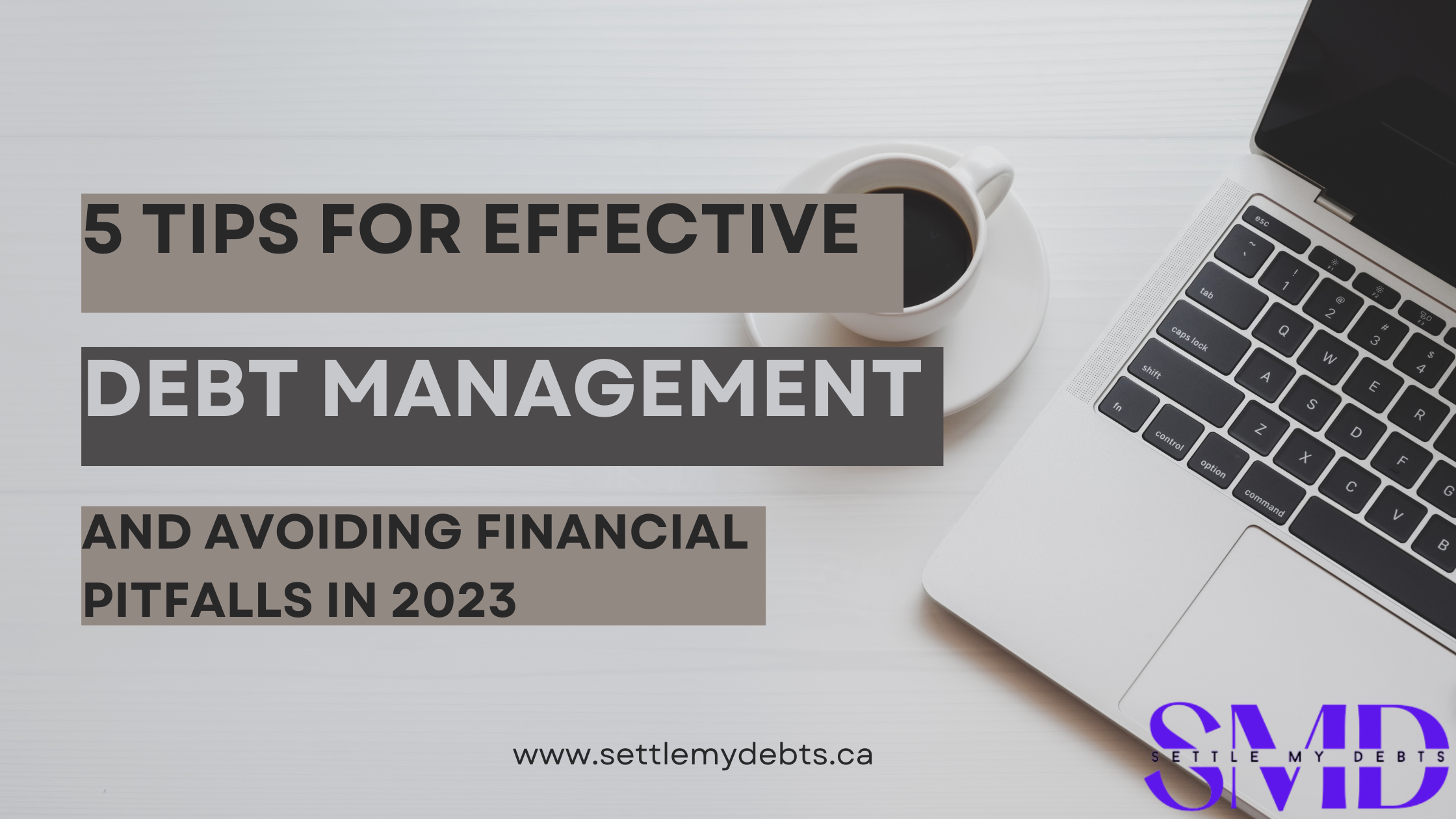Debt can be overwhelming and can have a significant impact on your financial well-being. However, with effective debt management strategies and sound financial habits, you can regain control of your finances and pave the way to a debt-free future. In this blog, we will explore five actionable tips for effective debt management and provide insights on avoiding common financial pitfalls. Let’s dive in!
Section 1: Create a Realistic Budget
1.1 Assess Your Income and Expenses: Start by evaluating your income sources and listing all your expenses. Categorize your expenses into essentials (e.g., housing, utilities, groceries) and non-essentials (e.g., dining out, entertainment). This exercise will help you understand your spending patterns and identify areas where you can cut back.
1.2 Set Priorities: Allocate your income towards essential expenses first, ensuring you meet your basic needs. Once these are covered, assign a portion of your income to debt repayment. By prioritizing debt repayment in your budget, you’ll make consistent progress towards becoming debt-free.
Section 2: Prioritize Debt Repayment
2.1 Snowball or Avalanche Method: Choose a debt repayment strategy that works best for you. The snowball method involves paying off the smallest debt first, while the avalanche method focuses on tackling high-interest debt first. Consider the psychological motivation of the snowball method versus the long-term savings of the avalanche method and select the approach that aligns with your financial goals.
2.2 Negotiate with Creditors: Reach out to your creditors to explore options for lower interest rates, reduced payments, or extended repayment terms. Many creditors are willing to work with you if they see your commitment to repaying your debts. Negotiating favorable terms can alleviate some financial strain and help you make steady progress towards debt freedom.
Section 3: Explore Debt Consolidation Options
3.1 Debt Consolidation Loans: Consolidating multiple debts into a single loan can simplify your repayment process. By obtaining a debt consolidation loan with a lower interest rate than your existing debts, you can potentially reduce your monthly payments and save money over time. However, it’s crucial to evaluate the terms, fees, and impact on your credit before pursuing this option.
3.2 Balance Transfer Credit Cards: Another option is transferring high-interest credit card balances to a card with a lower or zero percent introductory rate. This can provide temporary relief from interest charges, allowing you to focus on paying down the principal. Be mindful of any balance transfer fees and ensure you can repay the balance within the promotional period to avoid high interest rates.
Section 4: Seek Professional Guidance
4.1 Credit Counseling: Consider reaching out to reputable credit counseling agencies for personalized guidance. Credit counselors can help you create a realistic budget, negotiate with creditors, and develop a debt management plan tailored to your needs. Their expertise and experience can provide valuable insights and support throughout your debt repayment journey.
4.2 Financial Education: Take advantage of the resources offered by credit counseling agencies or reputable financial institutions. Educate yourself about personal finance, debt management, and budgeting. The more knowledge you gain, the better equipped you’ll be to make informed financial decisions and avoid falling into debt traps in the future.
Conclusion: Effective debt management requires discipline, planning, and the willingness to make necessary changes to your financial habits. By creating a realistic budget, prioritizing debt repayment, exploring consolidation options, and seeking professional guidance, you can regain control of your finances and pave the way to a debt-free future. Remember, small steps taken consistently can lead to significant progress. Start today, and embark on your journey towards financial freedom!
FAQ
1: How can I create a realistic budget to manage my debt effectively?
Creating a realistic budget is a crucial step in debt management. Start by assessing your income and expenses, categorizing them into essentials and non-essentials. Allocate your income to cover essential expenses first, then assign a portion to debt repayment. This way, you’ll have a clear plan for managing your finances and making progress towards becoming debt-free.
2: What’s the difference between the snowball and avalanche methods for debt repayment?
The snowball method focuses on paying off your smallest debt first, providing a psychological boost as you see quick wins. In contrast, the avalanche method targets high-interest debt first, saving you money in the long run. Choose the method that aligns with your financial goals and motivates you to stay on track.
3: How can I explore debt consolidation options to simplify my repayments?
There are two main debt consolidation options to consider. First, debt consolidation loans combine multiple debts into a single loan with a potentially lower interest rate, reducing monthly payments. Second, balance transfer credit cards offer introductory low or zero percent interest rates when you transfer high-interest credit card balances. Evaluate these options carefully, considering terms, fees, and credit impact.
4: When should I seek professional guidance for debt management?
Consider reaching out to reputable credit counseling agencies when you need personalized guidance. Credit counselors can assist you in creating a budget, negotiating with creditors, and developing a tailored debt management plan. They offer valuable expertise and support throughout your journey to become debt-free.
5: How can I educate myself about debt management and personal finance?
To enhance your financial knowledge, take advantage of resources offered by credit counseling agencies or reputable financial institutions. These resources cover topics like personal finance, debt management, and budgeting. The more you educate yourself, the better equipped you’ll be to make informed financial decisions and avoid falling into debt traps in the future.
Any further questions?

Leave a Reply